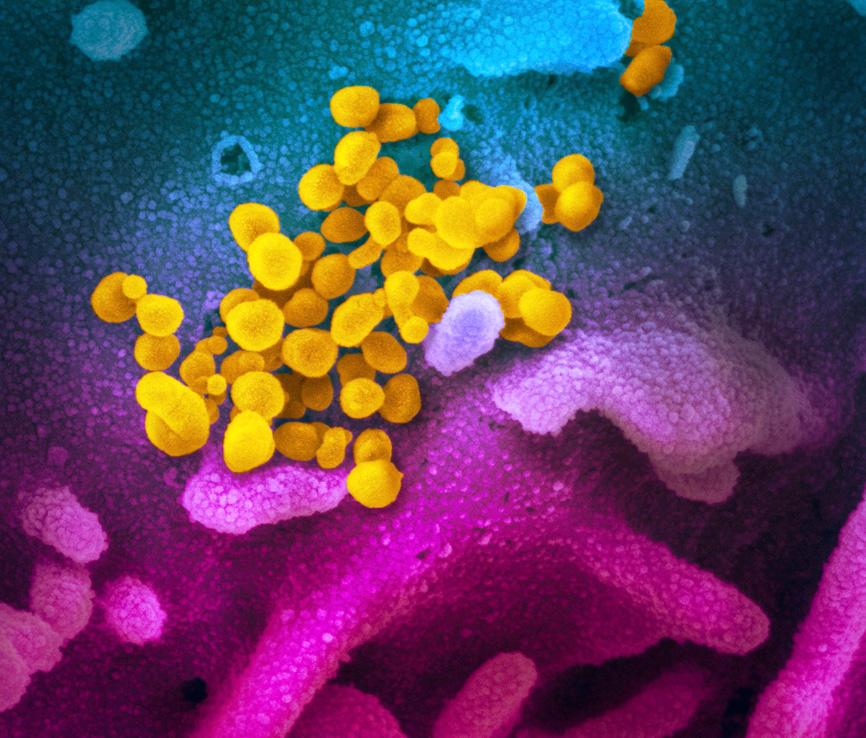The National Health Research Institutes (NHRI) yesterday said it has developed a rapid-testing kit that can screen people for SARS-CoV-2, the strain of coronavirus that causes COVID-19, while the Central Epidemic Command Center (CECC) said that such products have to be approved.
NHRI vice president Sytwu Huey-kang (司徒惠康) said that after more than a month of research, it has been shown that antibodies for SARS can also be used in the screening process for SARS-CoV-2.
The results can be produced in 10 to 15 minutes, Sytwu said.

Photo: AFP / National Institutes of Health
The NHRI is testing a number of coronaviruses to determine whether the reagent could be an exclusive test for COVID-19, he said.
The institutes next week would hold a meeting with businesses to discuss trial production of the kits, he said.
However, it is still uncertain when the kits might be ready for clinical use, he said.
Minister of Health and Welfare Chen Shih-chung (陳時中) told the CECC’s daily news briefing yesterday that the Centers for Disease Control (CDC) would have to verify the NHRI’s product, as well as others introduced by private companies abroad.
The CDC would help accelerate commercialization if they prove effective, said Chen, who also heads the CECC.
In other developments, the American Institute in Taiwan (AIT) posted on Facebook yesterday that US biotechnology company Gilead Sciences began clinical research collaboration with experts in Taiwan on potential treatment options.
The AIT did not name any drug in the post, but the company is known for developing remdesivir, a drug hoped to be a treatment for COVID-19.
“Gilead’s clinical trials in Asia are also taking place in China, Japan, S[outh] Korea, Singapore and Hong Kong. Last week, AIT and Taiwan’s Ministry of Foreign Affairs announced enhanced efforts to cooperate on addressing the spread of COVID-19. Scientific cooperation like this is one of the great examples of how we #StriveTogetherThriveTogether,” the AIT wrote.
Additional reporting by Lin Chia-nan

CHAOS: Iranians took to the streets playing celebratory music after reports of Khamenei’s death on Saturday, while mourners also gathered in Tehran yesterday Iranian Supreme Leader Ayatollah Ali Khamenei was killed in a major attack on Iran launched by Israel and the US, throwing the future of the Islamic republic into doubt and raising the risk of regional instability. Iranian state television and the state-run IRNA news agency announced the 86-year-old’s death early yesterday. US President Donald Trump said it gave Iranians their “greatest chance” to “take back” their country. The announcements came after a joint US and Israeli aerial bombardment that targeted Iranian military and governmental sites. Trump said the “heavy and pinpoint bombing” would continue through the week or as long

TRUST: The KMT said it respected the US’ timing and considerations, and hoped it would continue to honor its commitments to helping Taiwan bolster its defenses and deterrence US President Donald Trump is delaying a multibillion-dollar arms sale to Taiwan to ensure his visit to Beijing is successful, a New York Times report said. The weapons sales package has stalled in the US Department of State, the report said, citing US officials it did not identify. The White House has told agencies not to push forward ahead of Trump’s meeting with Chinese President Xi Jinping (習近平), it said. The two last month held a phone call to discuss trade and geopolitical flashpoints ahead of the summit. Xi raised the Taiwan issue and urged the US to handle arms sales to

State-run CPC Corp, Taiwan (CPC, 台灣中油) yesterday said that it had confirmed on Saturday night with its liquefied natural gas (LNG) and crude oil suppliers that shipments are proceeding as scheduled and that domestic supplies remain unaffected. The CPC yesterday announced the gasoline and diesel prices will rise by NT$0.2 and NT$0.4 per liter, respectively, starting Monday, citing Middle East tensions and blizzards in the eastern United States. CPC also iterated it has been reducing the proportion of crude oil imports from the Middle East and diversifying its supply sources in the past few years in response to geopolitical risks, expanding

Pro-democracy media tycoon Jimmy Lai’s (黎智英) fraud conviction and prison sentence were yesterday overturned by a Hong Kong court, in a surprise legal decision that comes soon after Lai was jailed for 20 years on a separate national security charge. Judges Jeremy Poon (潘兆初), Anthea Pang (彭寶琴) and Derek Pang (彭偉昌) said in the judgement that they allowed the appeal from Lai, and another defendant in the case, to proceed, as a lower court judge had “erred.” “The Court of Appeal gave them leave to appeal against their conviction, allowed their appeals, quashed the convictions and set aside the sentences,” the judges